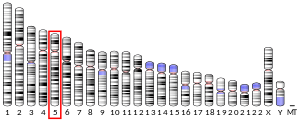PCDHGA12
Protocadherin gamma-A12 is a protein that in humans is encoded by the PCDHGA12 gene.[5][6]
| PCDHGA12 | |||||||||||||||||||||||||
|---|---|---|---|---|---|---|---|---|---|---|---|---|---|---|---|---|---|---|---|---|---|---|---|---|---|
| Identifiers | |||||||||||||||||||||||||
| Aliases | PCDHGA12, CDH21, FIB3, PCDH-GAMMA-A12, protocadherin gamma subfamily A, 12 | ||||||||||||||||||||||||
| External IDs | OMIM: 603059 MGI: 1935229 HomoloGene: 134588 GeneCards: PCDHGA12 | ||||||||||||||||||||||||
| |||||||||||||||||||||||||
| |||||||||||||||||||||||||
| |||||||||||||||||||||||||
| Orthologs | |||||||||||||||||||||||||
| Species | Human | Mouse | |||||||||||||||||||||||
| Entrez | |||||||||||||||||||||||||
| Ensembl | |||||||||||||||||||||||||
| UniProt | |||||||||||||||||||||||||
| RefSeq (mRNA) | |||||||||||||||||||||||||
| RefSeq (protein) | |||||||||||||||||||||||||
| Location (UCSC) | Chr 5: 141.43 – 141.51 Mb | Chr 18: 37.77 – 37.84 Mb | |||||||||||||||||||||||
| PubMed search | [3] | [4] | |||||||||||||||||||||||
| Wikidata | |||||||||||||||||||||||||
| |||||||||||||||||||||||||
This gene is a member of the protocadherin gamma gene cluster, one of three related clusters tandemly linked on chromosome five. These gene clusters have an immunoglobulin-like organization, suggesting that a novel mechanism may be involved in their regulation and expression. The gamma gene cluster includes 22 genes divided into 3 subfamilies. Subfamily A contains 12 genes, subfamily B contains 7 genes and 2 pseudogenes, and the more distantly related subfamily C contains 3 genes. The tandem array of 22 large, variable region exons are followed by a constant region, containing 3 exons shared by all genes in the cluster. Each variable region exon encodes the extracellular region, which includes 6 cadherin ectodomains and a transmembrane region. The constant region exons encode the common cytoplasmic region. These neural cadherin-like cell adhesion proteins most likely play a critical role in the establishment and function of specific cell-cell connections in the brain. Alternative splicing has been described for the gamma cluster genes.[6]
References
- GRCh38: Ensembl release 89: ENSG00000253159 - Ensembl, May 2017
- GRCm38: Ensembl release 89: ENSMUSG00000102428 - Ensembl, May 2017
- "Human PubMed Reference:". National Center for Biotechnology Information, U.S. National Library of Medicine.
- "Mouse PubMed Reference:". National Center for Biotechnology Information, U.S. National Library of Medicine.
- Wu Q, Maniatis T (Jul 1999). "A striking organization of a large family of human neural cadherin-like cell adhesion genes". Cell. 97 (6): 779–90. doi:10.1016/S0092-8674(00)80789-8. PMID 10380929.
- "Entrez Gene: PCDHGA12 protocadherin gamma subfamily A, 12".
Further reading
- Nollet F, Kools P, van Roy F (2000). "Phylogenetic analysis of the cadherin superfamily allows identification of six major subfamilies besides several solitary members". J. Mol. Biol. 299 (3): 551–72. doi:10.1006/jmbi.2000.3777. PMID 10835267.
- Yagi T, Takeichi M (2000). "Cadherin superfamily genes: functions, genomic organization, and neurologic diversity". Genes Dev. 14 (10): 1169–80. doi:10.1101/gad.14.10.1169 (inactive 2020-01-22). PMID 10817752.
- Clark HF, Gurney AL, Abaya E, et al. (2003). "The Secreted Protein Discovery Initiative (SPDI), a Large-Scale Effort to Identify Novel Human Secreted and Transmembrane Proteins: A Bioinformatics Assessment". Genome Res. 13 (10): 2265–70. doi:10.1101/gr.1293003. PMC 403697. PMID 12975309.
- Wu Q, Zhang T, Cheng JF, et al. (2001). "Comparative DNA Sequence Analysis of Mouse and Human Protocadherin Gene Clusters". Genome Res. 11 (3): 389–404. doi:10.1101/gr.167301. PMC 311048. PMID 11230163.
- Wu Q, Maniatis T (2000). "Large exons encoding multiple ectodomains are a characteristic feature of protocadherin genes". Proc. Natl. Acad. Sci. U.S.A. 97 (7): 3124–9. doi:10.1073/pnas.060027397. PMC 16203. PMID 10716726.
- Nagase T, Ishikawa K, Miyajima N, et al. (1998). "Prediction of the coding sequences of unidentified human genes. IX. The complete sequences of 100 new cDNA clones from brain which can code for large proteins in vitro". DNA Res. 5 (1): 31–9. doi:10.1093/dnares/5.1.31. PMID 9628581.
- Matsuyoshi N, Imamura S (1997). "Multiple cadherins are expressed in human fibroblasts". Biochem. Biophys. Res. Commun. 235 (2): 355–8. doi:10.1006/bbrc.1997.6707. PMID 9199196.



